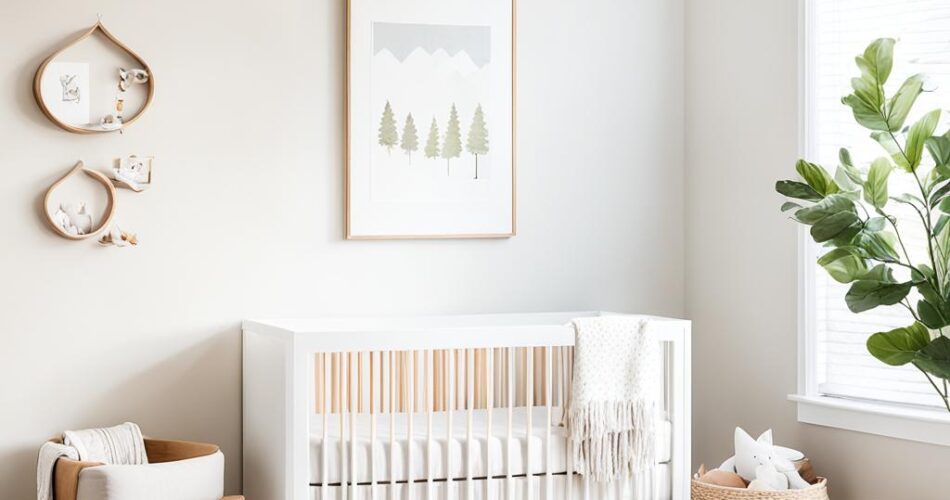Minimalist nursery design is a growing trend. It creates serene, uncluttered spaces for babies. These rooms are stylish, functional, and reduce stress for parents and infants.
Simple nurseries don’t lack comfort or charm. They offer a fresh take on baby room design. Streamlined styles can create beautiful, practical spaces.
Neutral colors and smart storage solutions are key. These elements help maintain a clean, simple look. Minimalist decor can transform any nursery into a calm haven.
Let’s explore the world of minimalist nurseries. We’ll cover key elements that make these spaces appealing. From furniture choices to natural elements, we’ll discuss it all.
Key Takeaways
- Minimalist nurseries focus on creating serene, uncluttered spaces
- Neutral color schemes are popular in minimalist nursery design
- Multifunctional furniture helps maximize space and functionality
- Natural elements and textures add warmth to simple nursery designs
- Clever storage solutions are essential for maintaining a clean aesthetic
- Minimalist decor can create a calm environment for both parents and babies
Understanding Minimalist Nursery Design
A minimalist nursery creates a calm, functional space for your baby. It focuses on simplicity and purpose, removing unnecessary clutter. This design philosophy offers many benefits for your family.
Key Principles of Minimalism
Minimalist nurseries prioritize simplicity and functionality. They aim to create a serene environment that’s easy to maintain.
- Use a neutral color palette
- Choose multi-functional furniture
- Incorporate natural materials
- Keep decor simple and purposeful
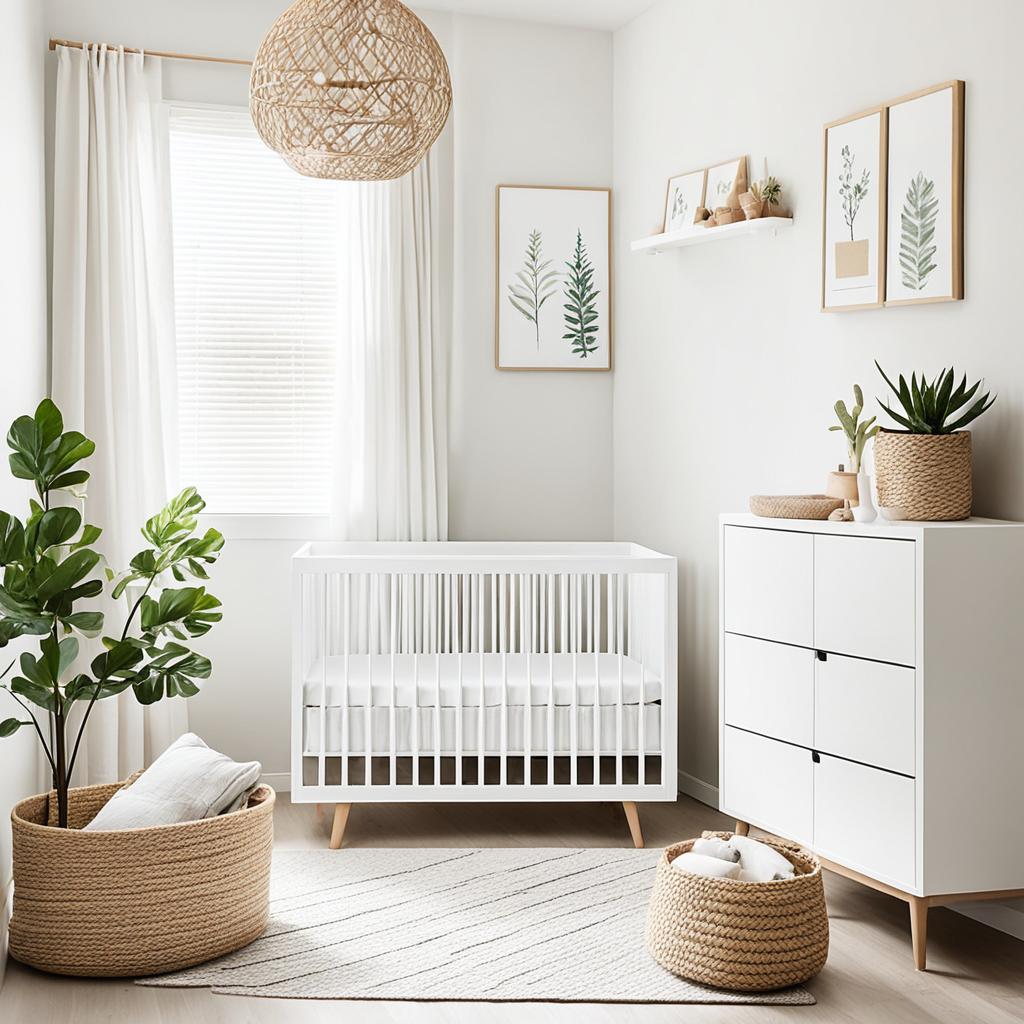
Benefits of a Minimalist Nursery
A minimalist nursery design offers several advantages:
- Reduced clutter for easier cleaning
- Calming atmosphere for baby and parents
- Cost-effective due to fewer items needed
- Adaptable as your child grows
Minimalist approaches can lead to significant savings. One family spent just $367 on IKEA nursery furnishings. This was much less than the $1,409 estimate for buying new items.
Balancing Functionality and Aesthetics
Functional nursery design doesn’t mean sacrificing style. Choose essential items that serve a purpose while looking good. Consider these tips:
- Choose a convertible crib that grows with your child
- Opt for a dresser that doubles as a changing table
- Use closet space for storage to keep the room clutter-free
- Select neutral-colored bedding for a timeless look
Minimalist nurseries create peaceful spaces that are practical and beautiful. Focus on essentials and versatile pieces. This way, you’ll design a room that evolves with your growing family.
| Essential Item | Purpose | Estimated Cost |
|---|---|---|
| Convertible Crib | Sleeping, converts to toddler bed | $119 – $300 |
| Dresser/Changing Table | Storage, diaper changes | $200 – $500 |
| Rocking Chair | Feeding, comforting baby | $150 – $400 |
| Neutral Bedding Set | Comfort, style | $50 – $150 |
Focus on these core elements to create a functional nursery. You’ll achieve minimalist principles without sacrificing comfort or style.
Choosing a Neutral Color Palette
Neutral nursery colors create a calm, versatile space for your baby. Minimalist color schemes offer timeless appeal that grows with your child. Let’s explore popular options for neutral nursery design.
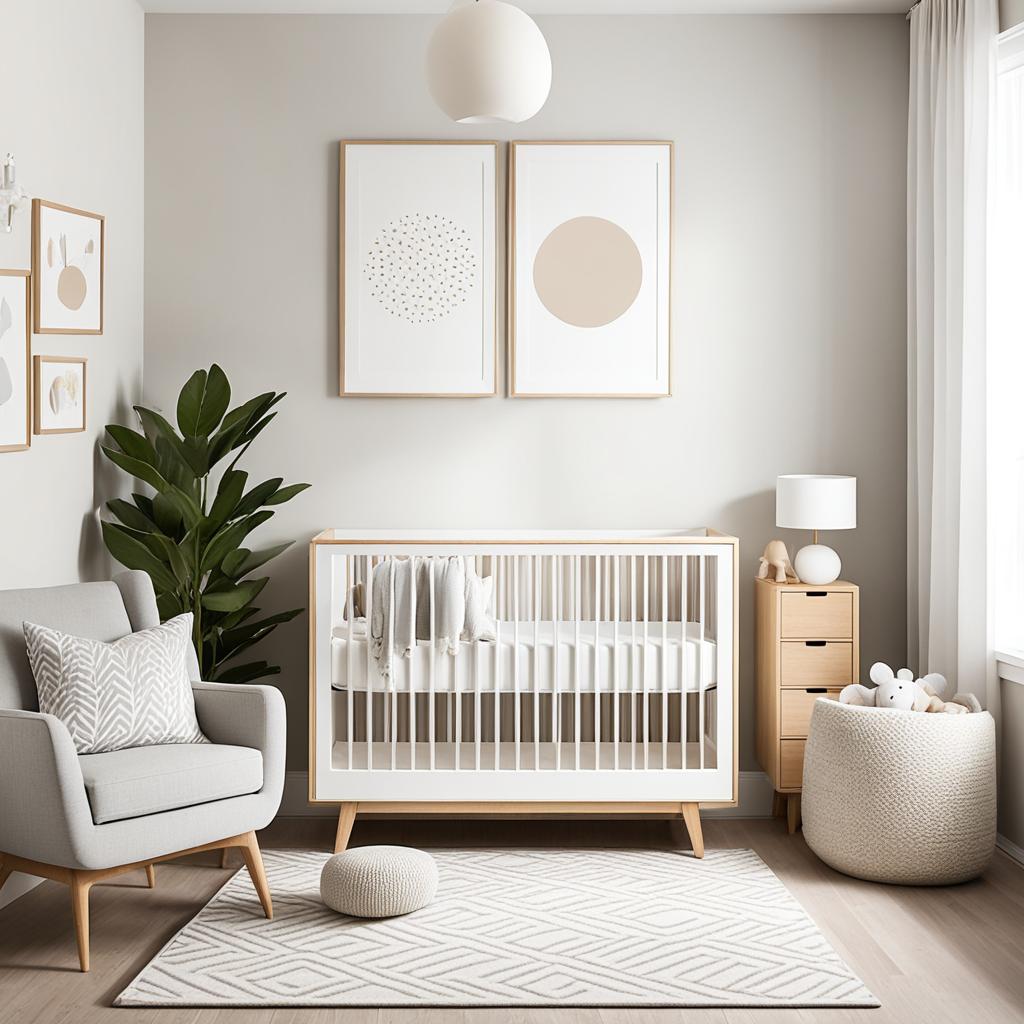
Gray is a classic choice for building a nursery base. It pairs well with other hues and creates a soothing atmosphere. Consider a blue-gray shade for added tranquility.
Earth tones are trending in neutral nursery design. Sandy browns, ocean teals, and peachy corals bring warmth to the space. These colors work well in monochrome themes or as accents.
- Sage green: A gender-neutral option perfect for minimalist nurseries
- Pastel pink: Adds a touch of tenderness without overwhelming the space
- Golden yellow: Brings joy and energy as an accent color
Gender-neutral nurseries are practical and visually appealing. They allow for easy reuse with future children, reducing waste. Neutral color schemes also promote better sleep for babies and adults.
“Creating a gender-neutral nursery with a neutral color palette allows for versatility and longevity in design.”
| Palette Name | Colors | Theme |
|---|---|---|
| Neutral Nursery Design | Cedar Key OC-16, Soft Chamois OC-13 | Versatile, Grows with Child |
| Modern Nautical Nursery | Constellation AF-540, Wild Flower 2090-40, Hale Navy HC-154 | Gentle Nautical |
| Light & Breezy | Whites, Creams, Light Grays | Airy and Calm |
Choose colors that can adapt as your baby grows. This ensures your nursery design stays relevant through the teen years. It’s a smart long-term investment for your child’s room.
Essential Furniture for a Minimalist Nursery
A minimalist nursery needs careful selection of key furniture pieces. The aim is to boost function while keeping a clean look. Let’s look at the main parts of minimalist nursery furniture.
Convertible Cribs
Convertible cribs are vital in minimalist nursery design. They grow with your child, changing from crib to toddler bed. The Babyletto Gelato Crib in Washed Natural fits well in an 8.5 x 10 ft nursery.
- Made from sustainable materials like 100% ethically-sourced beechwood
- Adjustable mattress height for different stages of development
- Clean lines and neutral colors to match minimalist aesthetics
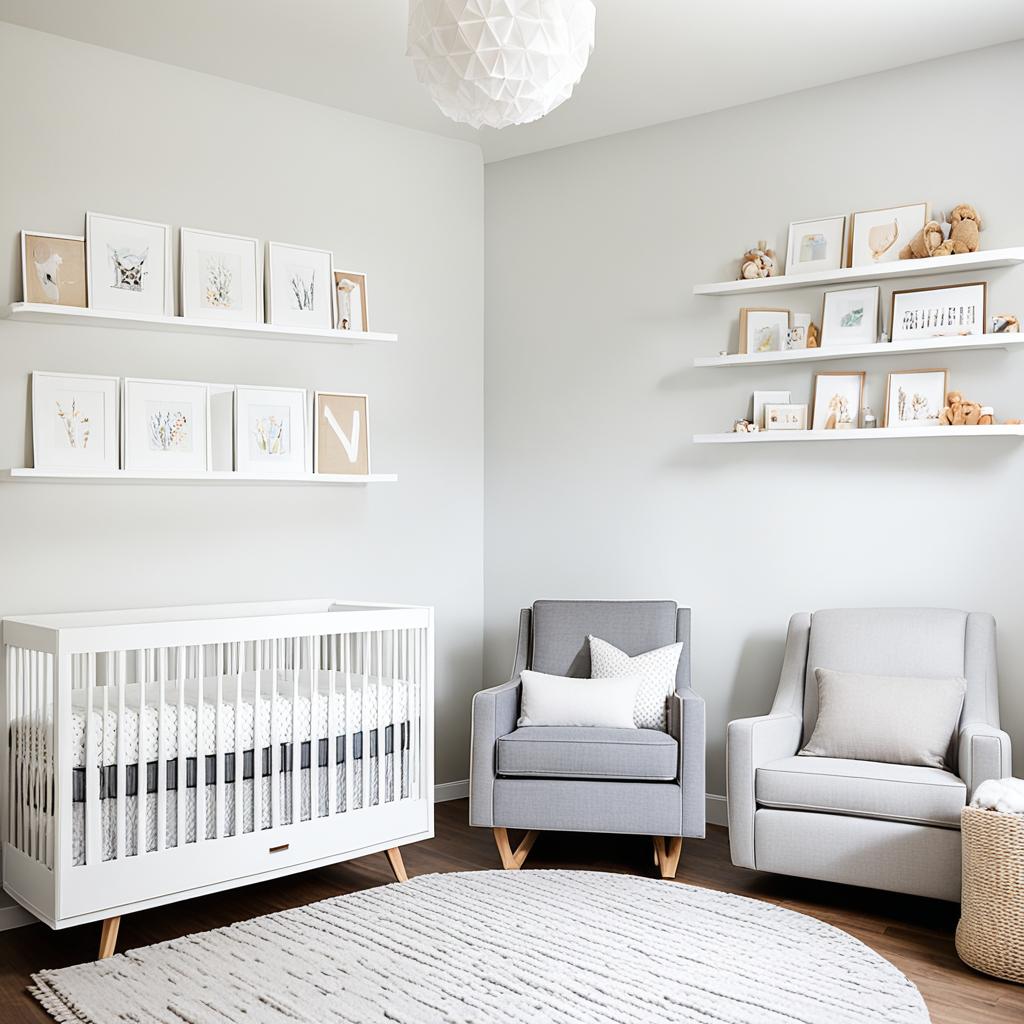
Multifunctional Changing Tables
These tables are key for a minimalist nursery. The Babyletto Gelato Dresser in White serves as a changing station and storage. It helps keep the room tidy while offering space for diaper changes.
- Removable changing tray for easy conversion to a standard dresser
- Multiple drawers for efficient storage of baby essentials
- Smooth surfaces for easy cleaning and maintenance
Comfortable Seating Options
Minimalist seats focus on comfort and saving space. The CB2 Saic Quantam Rocking Chair in Fabric: Notion, Gunsmoke shows this balance. Its slim design fits well in small nurseries.
| Furniture Item | Key Features | Benefits |
|---|---|---|
| Convertible Crib | Adaptable design, sustainable materials | Long-term use, eco-friendly choice |
| Multifunctional Changing Table | Dual-purpose, ample storage | Space-saving, organized nursery |
| Minimalist Seating | Compact design, comfortable fabric | Space-efficient, cozy feeding area |
Focus on these key pieces to create a calm, useful space for your baby. Choose items that offer many uses and grow with your child. This will help you save money and keep the minimalist look over time.
Minimalist Nursery Ideas for Storage Solutions
Smart storage is crucial in a minimalist nursery. Every inch counts in limited space. Let’s explore clever solutions to keep your baby’s room clutter-free and stylish.
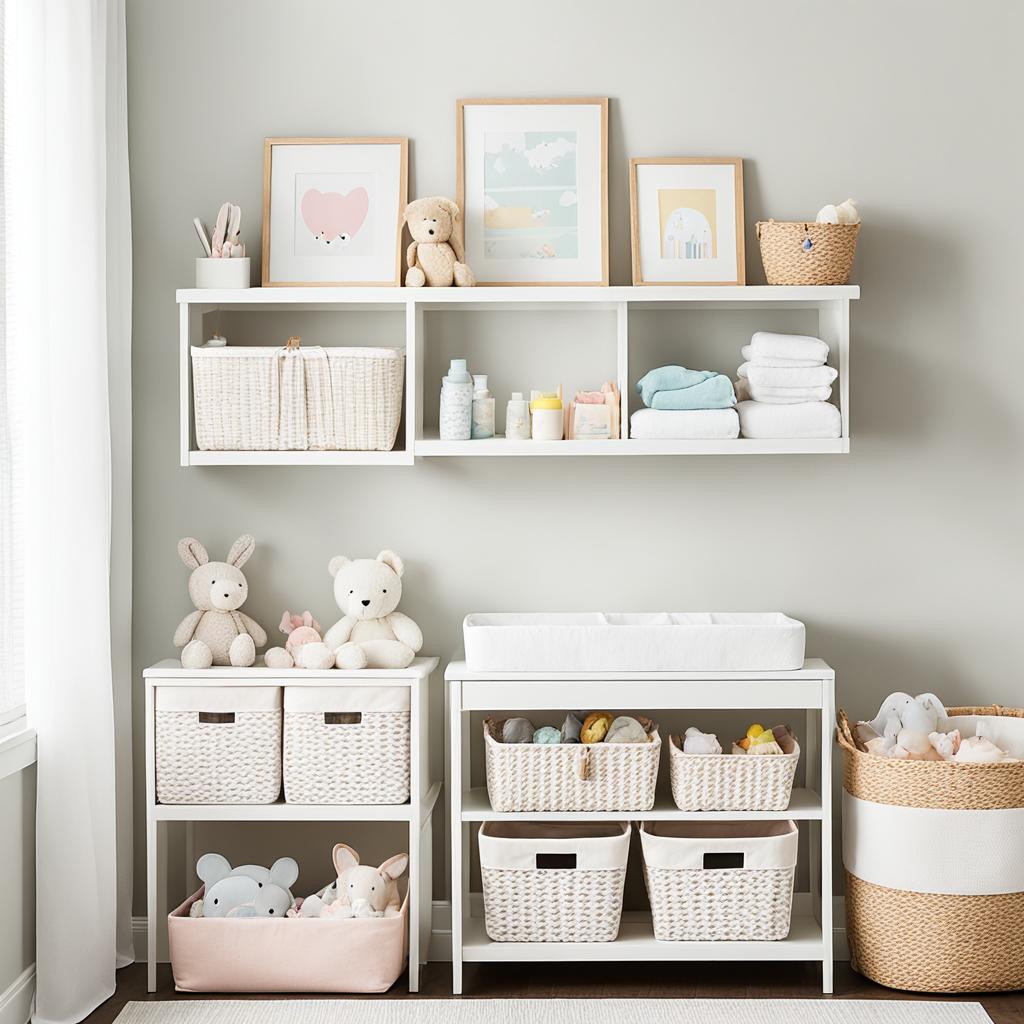
Space is precious in a typical 63 square foot nursery. Creative ideas are needed for minimalist nursery storage without a closet. The goal is to keep essentials accessible while maintaining a serene environment.
A multifunctional dresser serves as both storage and a changing table. Use drawer organizers to separate clothing types. This approach maximizes space and simplifies your daily routine.
- Top drawer: 15-20 sleepers and onesies
- Middle drawer: 12 pants and shorts
- Bottom drawer: Accessories and extra bedding
Utilize under-crib space with storage baskets. This area is perfect for diapers, bedding, or out-of-season clothes. Label each basket for easy access.
Wall-mounted shelves offer additional storage without cluttering floor space. Display special outfits or keepsakes here. It’s both functional and decorative.
For toys and books, choose minimalist storage like floating cubes or woven baskets. These blend seamlessly with your nursery’s aesthetic while keeping items tidy.
“In a minimalist nursery, every item should have a purpose and a place. Clutter-free nursery organization isn’t just about looks—it creates a calm environment for your baby to thrive.”
You don’t need every gadget marketed to new parents. Focus on essentials: a comfortable feeding chair and a soft rug. Invest in dark curtains for nap time.
These minimalist storage ideas will create a serene, organized space for your little one. It’s about making room for what truly matters, not having less.
Incorporating Natural Materials and Textures
Natural materials bring warmth to minimalist baby rooms. Wood elements, organic textiles, and woven accents create a serene space. Your little one will thrive in this inviting environment.
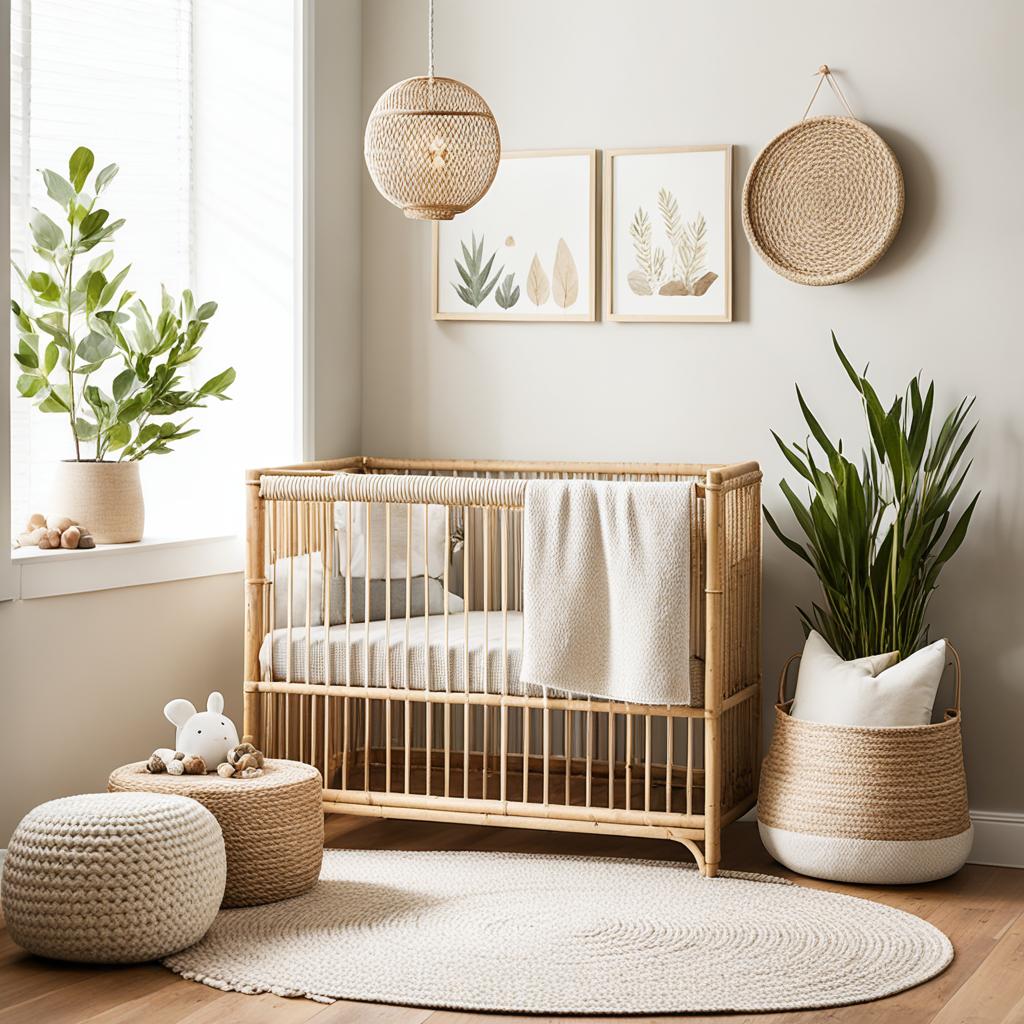
Wood Elements
Wood forms the foundation of a nature-inspired nursery. Choose furniture with clean lines and natural finishes. A pine or beech crib adds Scandinavian simplicity to the room.
Wooden shelves or dressers serve as storage and decor. They showcase the beauty of natural grain patterns. These pieces add character to the nursery.
- Convertible wooden crib
- Solid wood changing table
- Floating wooden shelves
- Wooden rocking chair
Organic Textiles
Organic textiles soften wood elements and create coziness. Use natural fibers like cotton, linen, or bamboo for bedding and curtains. These materials are gentle on your baby’s skin.
Organic fabrics align with eco-friendly design principles. They promote a healthier sleep environment for your little one.
“Organic textiles not only feel luxurious but also promote a healthier sleep environment for your baby.”
Woven Accents
Woven accents add texture to your minimalist nursery. Use baskets for storage and macrame for wall hangings. A jute rug creates depth and warmth in the room.
These elements maintain a natural look while providing functional benefits. They enhance the overall aesthetic of the nursery.
| Woven Accent | Purpose | Material |
|---|---|---|
| Storage baskets | Organize toys and supplies | Seagrass or rattan |
| Wall hanging | Decorative focal point | Cotton macrame |
| Area rug | Comfort and sound absorption | Jute or wool |
Combining wood, organic textiles, and woven accents creates a harmonious space. This approach enhances visual appeal and promotes a calm environment. Your baby will grow and thrive in this nature-inspired nursery.
Lighting Options for a Serene Atmosphere
The right lighting creates a serene nursery atmosphere. Minimalist nursery lighting sets the mood and supports your baby’s development. Let’s explore options for a peaceful environment.
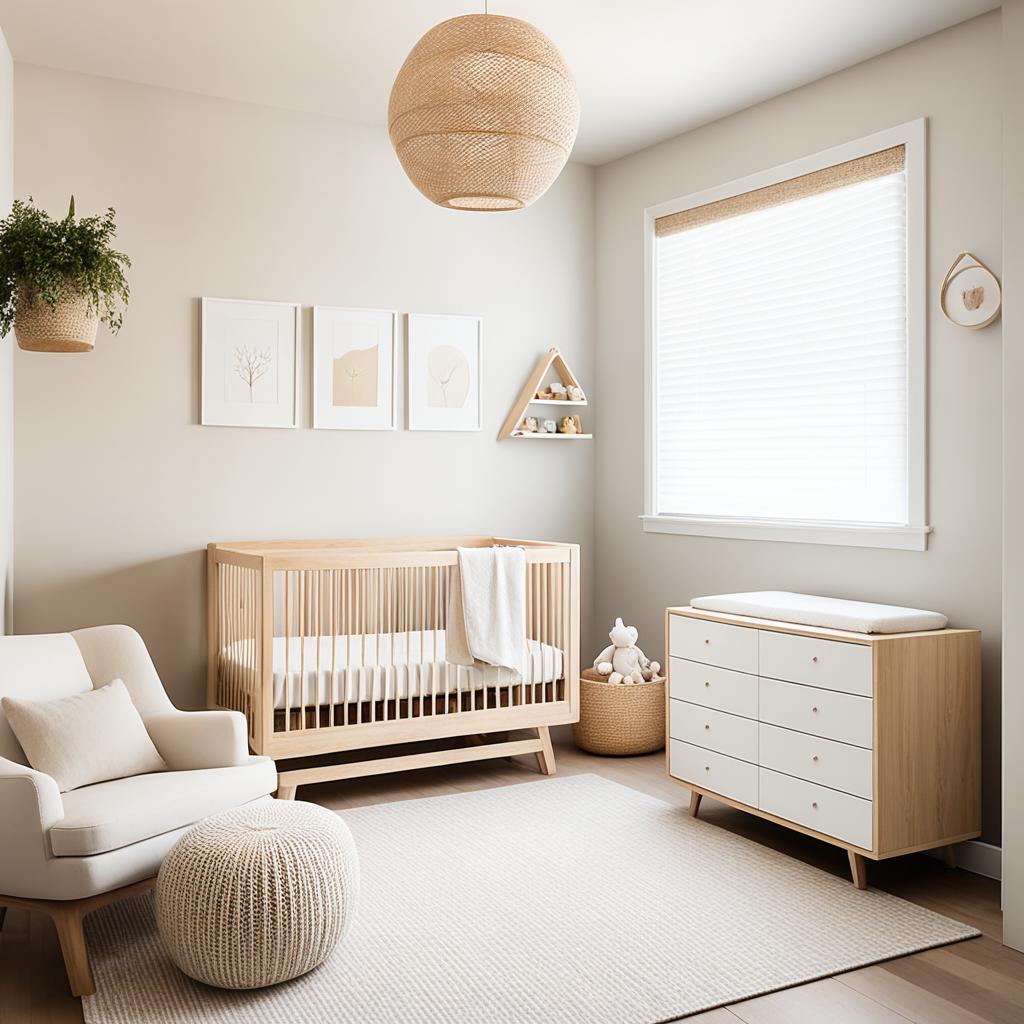
Gentle lighting is key for a calming nursery space. Natural light helps regulate your baby’s sleep-wake cycle. It can make falling asleep easier and naps longer.
Consider these serene nursery atmosphere enhancers:
- Dimmable ceiling lights (2700K-3000K for a cozy glow)
- Adjustable wall sconces for directed illumination
- Soft floor lamps with flexible positioning
- LED night lights with automatic shut-off features
Choose ETL-certified fixtures for safety. Opt for warm hues in orange and red spectrums. These are less stimulating and perfect for bedtime routines.
“Lighting is the unsung hero of nursery design, silently shaping your baby’s world and sleep patterns.”
Create multiple lighting zones in your nursery. This approach caters to different activities and moods:
- Bright area (4000K-5000K) for playtime and learning
- Dim corner for nighttime feedings and diaper changes
- Soft ambient lighting for a soothing overall ambiance
Smart technology can enhance your minimalist nursery lighting. Motion sensor lights help during late-night check-ins. Remote-controlled options allow easy adjustments without disturbing your baby.
Balance functionality with aesthetics for a serene nursery atmosphere. Choose simple, streamlined fixtures that match your minimalist design. These should provide gentle lighting for your baby’s comfort and growth.
Wall Decor and Art in a Minimalist Nursery
A calm nursery space is vital for your little one. The right wall decor can create a stylish haven. Let’s explore minimalist nursery wall art and simple decor ideas.
Simple Wall Art Ideas
For minimalist nursery wall art, less is more. Consider black and white prints, abstract line drawings, or neutral-toned watercolors.
Framed nature photographs also work well. The Lunar 6 Piece Modern Wall Art set perfectly embodies minimalist nursery style.
Minimalist Shelving Options
Minimalist shelving serves as both storage and decor. The Branch Open Shelf Changing Table is an excellent choice. It provides a changing area and open shelves for books and toys.
Other minimalist shelving ideas include floating shelves, ladder shelves, and wall-mounted cubbies.
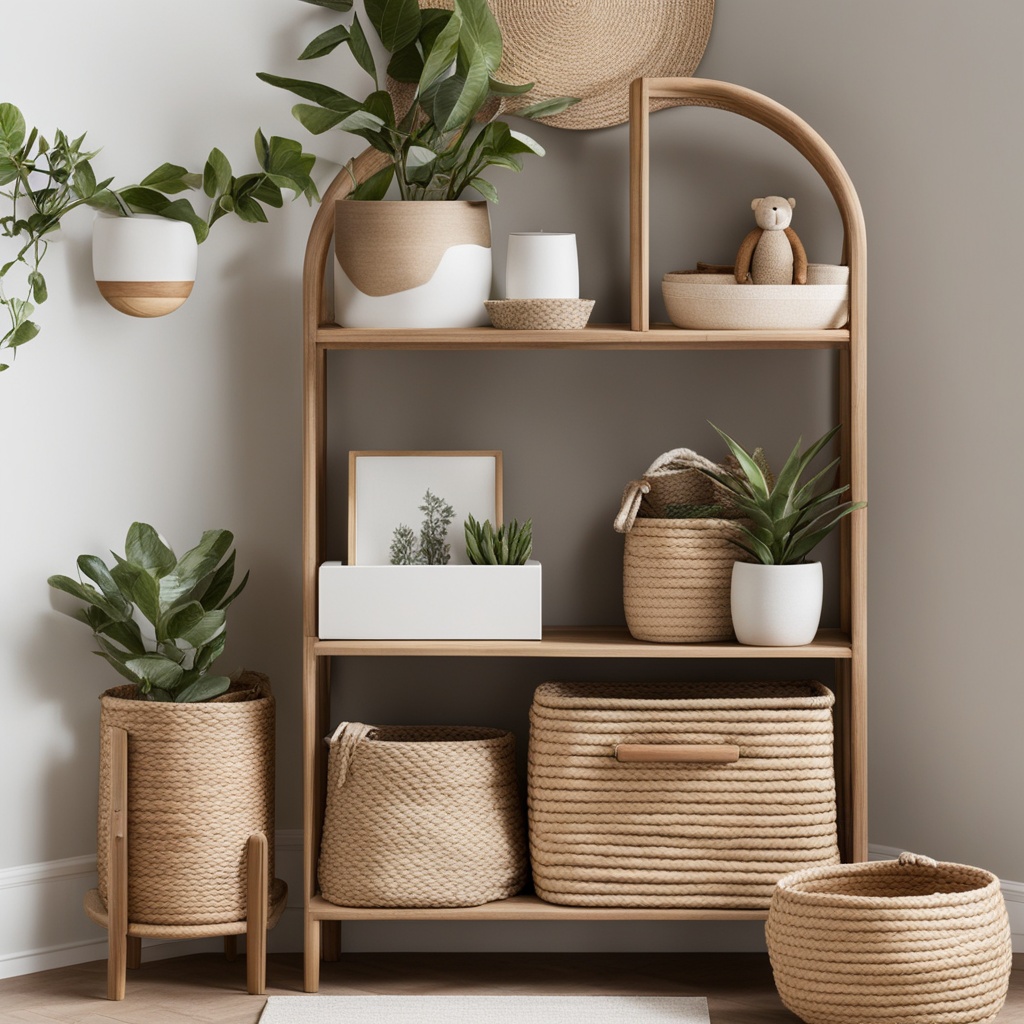
Using Negative Space Effectively
Negative space is key for a calm, open nursery. Leave ample wall space between decor items. Choose a focal point and arrange other elements around it.
Use light colors to make the room feel more spacious. In a minimalist nursery, every item should have a purpose.
Stick to essentials and avoid cluttering walls. This approach creates a serene environment and makes the space feel larger.
By choosing simple nursery decor and embracing negative space, you’ll create a stylish, functional nursery. It will grow with your child and provide a peaceful atmosphere.
Minimalist Nursery Organization Tips
A clutter-free nursery creates a calm, functional space. These practical tips will help organize baby essentials while maintaining style. Let’s explore how to keep your nursery tidy and minimalist.
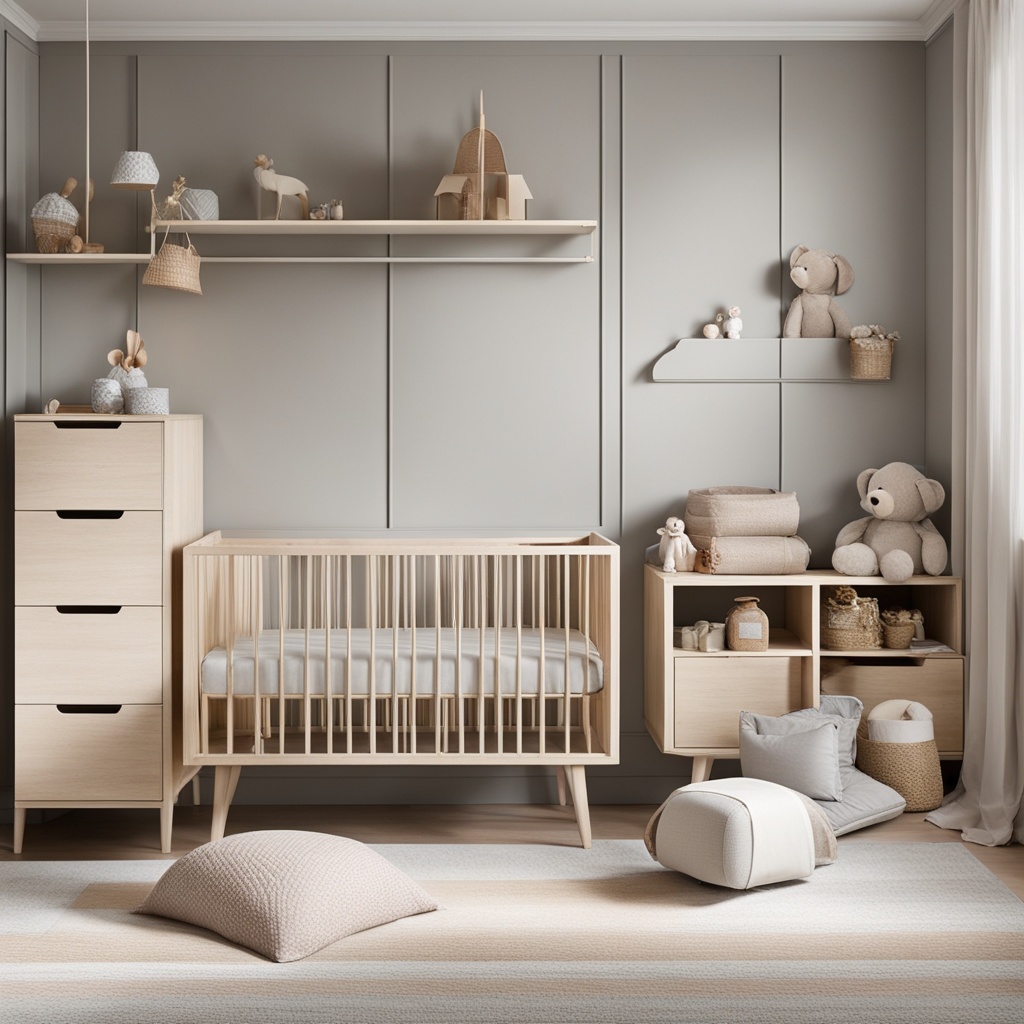
Adopt a “one in, one out” rule to prevent clutter buildup. When you bring in something new, remove an item you no longer need. This simple practice maintains a minimalist nursery organization system.
Use drawer dividers and closet organizers for tidy baby clothes. Foldable Cloth Divider Storage Boxes in sets of 6 work well for drawers. This method makes finding what you need quick and easy.
- Dedicate one top dresser drawer solely for daytime and nighttime diapers
- Use clear glass jars to store pacifiers
- Implement labeled baby closet dividers to categorize clothes by size
- Apply White Space Saving Hangers for a uniform closet appearance
Incorporate Cube Organizer Shelves with Fabric Cube Storage Bins for efficient storage. These versatile options contain books and toys while maintaining a clean look. They’re perfect for keeping the nursery organized.
Maximize closet space with Adjustable Door Shelves. This clever tip keeps dresser drawers clutter-free and creates extra storage areas. It’s a great way to organize baby essentials.
“A place for everything and everything in its place” is the golden rule of minimalist nursery organization.
Create designated spaces for frequently used items. This ensures easy access and maintains a tidy appearance. Use low, open shelving for toys and books to encourage independent play.
Regularly declutter and reassess the necessity of items in your nursery. This practice is crucial for maintaining a minimalist organization system. Your goal is to create a serene, functional space for your little one.
Creating a Cozy and Inviting Space
Cozy minimalist nurseries blend simplicity with warmth. Modern designs are trending, with neutral colors and clean lines. Parents prioritize nurturing environments while embracing minimalism.
Soft textiles and layering
Soft textiles add comfort to minimalist spaces. Choose 100% cotton bedding for your nursery. Layer plush blankets and cushions for coziness without clutter.
Neutral shades like gray, beige, and white are popular color choices. These palettes align with the minimalist aesthetic in nursery designs.
Comfortable floor coverings
Soft rugs or play mats are crucial for tummy time and play. They provide a safe, cushy surface for your baby. These floor coverings blend comfort and style in minimalist nurseries.
Gentle lighting options
Gentle lighting creates a soothing ambiance in nurseries. Use table lamps or wall sconces with warm bulbs. Soft, diffused lighting is ideal for a calming environment.
By combining these elements, you’ll create a cozy minimalist nursery. It will be both stylish and nurturing for your little one.
